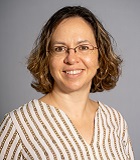Reflection on Distributed and Interim Leadership in Accredited Schools and Programs of Public Health
Posted on
January 31, 2024
By Interim Dean Gina Lovasi, PhD, MPH
I am looking forward to connecting with leaders across public health schools and programs in March at the ASPPH annual meeting. As I plan my itinerary, I thought I would share about the distributed leadership from Dornsife that will be present, and also reflect on the prevalence of interim and acting titles in our field at this time.

Presentations and Presence from Dornsife at the ASPPH Annual Meeting
Our Office of Education, led by Interim Associate Dean Melissa Kaufman, EdD, will have three members present whose expertise and responsibilities span instructional design and educational operations; student engagement and advising; and career services and experiential learning.
Tariem Burroughs, PhD, M.S.Ed., MSODL, will present on Thursday, March 21 about
Incorporating Project Based Learning Methodology into Assessing and Evaluating Applied Practical Experiences and is also moderating a discussion of Applied Practice Experiences: Meeting the Needs of Both Students and Sites.
These are topics close to the interests of Interim Associate Dean for Public Health Practice Jennifer Taylor, PhD, MPH, CPPS, who will also join us. Our Office of Diversity, Equity, Inclusion, and Belonging (DEIB), led by Associate Dean for DEIB Reneé H. Moore, PhD, will be additionally represented by Jordan Wilson and Rory Schonning, who together will present in a session on Thursday, March 21 on Student Engagement in DEIB Work.
Others from the Dean’s office planning to attend include myself, Associate Dean for Faculty Affairs Loni Philip Tabb, PhD, and Associate Dean for Finance and Administration Mary Ellen Sarno.
I’m looking forward to hearing about innovative approaches, sharing about what we are putting into place to live up to our aspirations, and to connecting with peers and with each other. Especially in a year where we will undertake an update to our school’s strategic plan, the refreshed perspective and change of pace are welcome.
Why Are There So Many Interim and Acting Leaders in Public Health, and What Does It Mean for Us?
Through public health leadership "we are looking to integrate who we have been into what we can now become, without letting nostalgia, inertia, or loss aversion block us from pursuing emerging possibilities." - Gina Lovasi
Of the 142 CEPH-accredited schools and programs in the ASPPH directory, 17 (12 percent) have primary representatives with an “interim” or “acting” title, including myself. I will be curious to learn from others their ideas on why this is, if indeed this is higher than expected. For now, I have a few thoughts on the tensions that make leadership in public health at this time a tough sell, even beyond challenges faced by higher education generally:
a. We strive to be a source of evidence for those organizations that share our commitment to improving public health and health equity, but are also using evidence in a more adversarial way by calling out harmful policies and practices or misinformation.
b. We aim to provide excellent training that meets students where they are and offers grace, but also must serve as guardians against incompetence, overreach, and disingenuous behaviors in the future public health workforce that could undermine already tenuous trust in the field of public health.
c. We are looking to integrate who we have been into what we can now become, without letting nostalgia, inertia, or loss aversion block us from pursuing emerging possibilities.
These tensions must be navigated within a landscape of financial, logistical, and interpersonal challenges and tradeoffs.
Yet perhaps given the seriousness and uniqueness of challenges we face, it is a crucial time to engage more individuals in leadership. A distributed understanding can emerge through shorter than traditional stints in leadership, helping to bring more people in. Those who have served in interim roles can sympathize with the harder parts of leadership and suggest ideas for what might work better. Not everything we experiment with as a field will move us in the right direction, but we are in this to use and build upon what we know. Getting everything perfect right now is less important than staying engaged and showing up each day for our colleagues, the public we serve, and the students who will pick up where we leave off. To my fellow interim and acting leaders – let’s share what we are learning. We’ve got this.